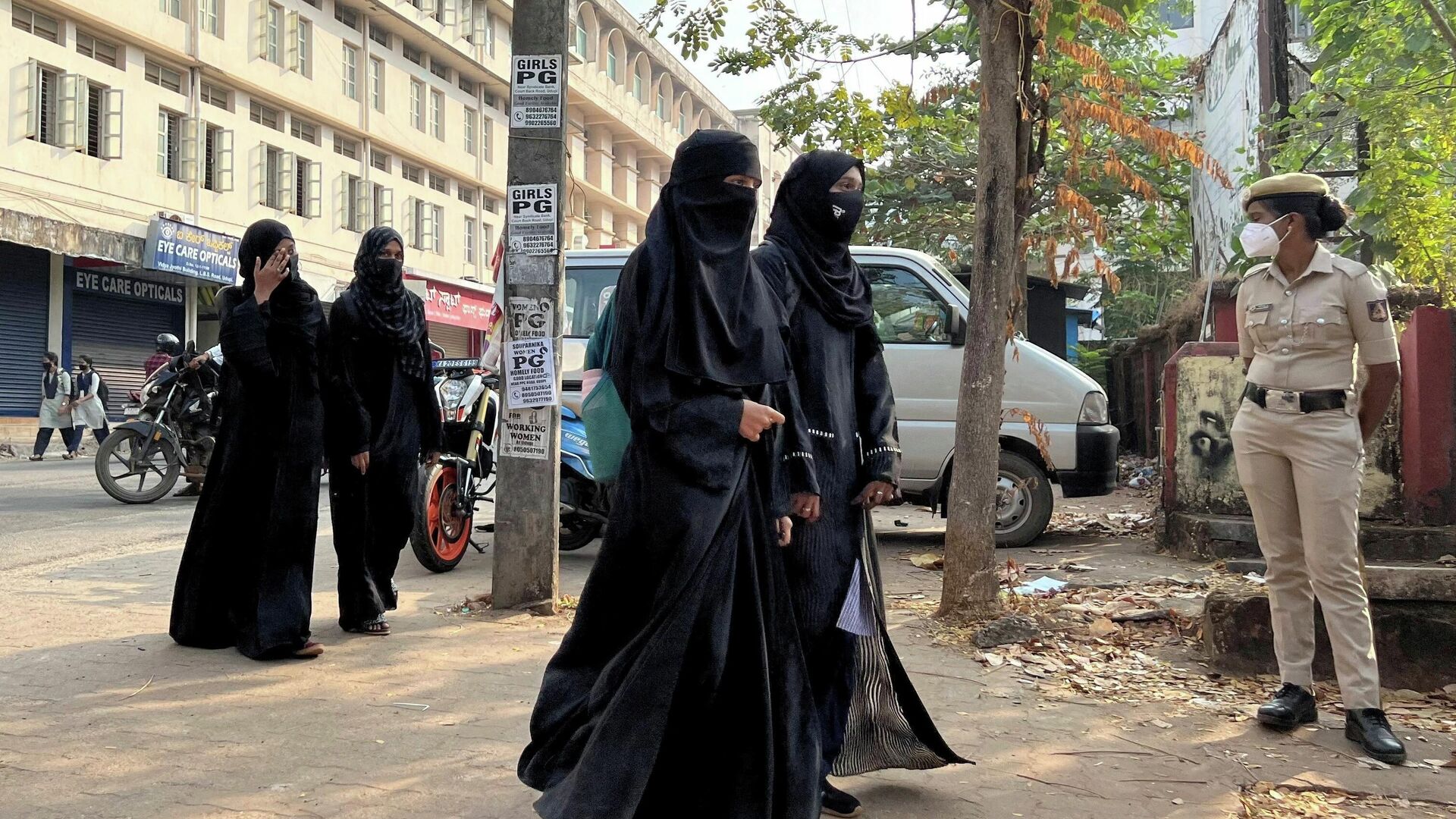'It's Like Choosing Between Education and Our Identity': Muslim Students on Hijab Row
08:56 GMT 17.03.2022 (Updated: 10:42 GMT 19.07.2022)

© REUTERS / Sunil Kataria
Subscribe
On Wednesday, the Karnataka High Court upheld the ban on Hijabs in the state's educational institutes. The court held that Hijab is not an essential part of Islam and thus cannot be protected under the fundamental right to religion.
Hours after a three judge-bench of the Karnataka High Court upheld the Hijab ban on Tuesday, many Muslim girl students expressed their disappointment over the verdict, and approached the country's apex court, challenging the decision.
The Muslim students believe that the High Court verdict is a "clear case of discrimination against them and violates their religious freedom".
Sputnik spoke with Hijab-clad students and scholars who believe that public display of one's religious faith is typical in a multi-cultural country like India. They say the ruling also creates "psychological and social discrimination".
The petitioners were a group of Muslim girls who were barred from class for wearing Hijab in a pre-university college (equal to high school) in the Udupi District of India's Karnataka state.
These girls protested it, saying that they have been wearing Hijabs in the classroom for years and if they're forced to remove Hijab, it would violate their religious freedom.
Demoralising Judgement
Simra Ansari, a student of Delhi's Jamia Millia Islamia University, called the judgement "demoralising".
"The whole situation is created by Hindu groups, and it's a well-planned, systematic attack on our community," she said.
She said it feels as if the state is trying to dehumanise our identity.
"Now, we have to choose between education and our religious belief, our identity. Even as per statistics, the Muslim women are the most oppressed and backward community across the country," Ansari said.
Creating Social Separatism
Nabiya Khan, a poet and educator, feels that the Karnataka state government could have handled the matter more sensitively.
"State government could have handled the matter more sensitively and could have helped out these Muslim students at the local level. Despite that, the government sidelined Muslim girls without seeing the ill-effects," Khan said, noting that "education comes under state list, meaning that the state government has the complete right to decide the dress code in school."
She said every government institution behaved as a mute spectator when the mob was harassing Hijab girls.
In February, clashes erupted among Hindu and Muslim students in the Udupi District; in one of the videos which went viral, Hindu students heckled a Hijab-clad girl.
When Muslim girl arrives at PES College, She's been heckled by several 'students' wearing #saffronshawls #KarnatakaHijabRow pic.twitter.com/qa3UDbMPST
— Mohammed Zubair (@zoo_bear) February 8, 2022
Khan also said that minutes after the Karnataka court's verdict, the Bharatiya Janata Party (BJP) -governed National Commission of Women (the statutory body for women's rights) welcomed the court's decision.
"However, NCW failed to take action when Muslim girl students were heckled. What kind of message are you trying to spread?" Khan questioned. "This is like creating social separatism," she added.
'Not Court's Job to Decide What is Essential to Our Faith'
Meanwhile, speaking on the 129-page court verdict, Huma Masih, a Delhi-based student activist, said, "It should not be the court's job to decide what is or is not essential to any faith."
Masih also blamed the court for its selective reading of a particular English translation of the Quran and setting a dangerous precedent.
"The allowing of turbans and even kirpans for students of the Sikh community reflects a broad principle of tolerance and empathy. The question of Hijab could have been dealt with in a similar vein," Masih stressed.
The Indian government has several incentive schemes like mid-day meals, free uniforms, and books to promote the schooling system and compel parents to send their children to school.
In some states, there are separate schemes for girls. Suddenly, "Muslim girls are denied an education because they are wearing something that is a must in their religion", Sayema Rahman, an Indian radio jockey, said.
"Indian societies are still conservative and hijab is liberating as it allows women to get an education," Rahman stressed.
However, when the court draws a false parallel between the Hijab and a saffron shawl, it validates the strategy of Hindu groups who had started distributing saffron shawls as a political gimmick to intimidate Muslim women students and counter their demand for the ability to wear the Hijab; it's disturbing and sad at the same time, Rahman added.
A total of 230 girl students in Udupi District missed their exams for not being allowed to attend in Hijabs. The number may swell to thousands if the court's decision is implemented across Karnataka.
Meanwhile, the Supreme Court of India will be hearing the matter after 21 March.

